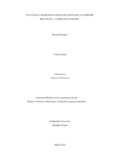
Please use this identifier to cite or link to this item:
https://hdl.handle.net/20.500.14301/339| Title: | CULTURALLY RESPONSIVE ENGLISH LANGUAGE CLASSROOM PRACTICES: A NARRATIVE INQUIRY |
| Authors: | Prajapat, Bharati |
| Citation: | Prajapati,B.(2023).Culturally responsive English language classroom practices: A narrative inquiry. |
| Issue Date: | 2023 |
| Publisher: | Kathmandu School of Education |
| School: | SOED |
| Department: | DOLE |
| Level: | M.Phil. |
| Program: | Master of Education in ELT (2 years) |
| Abstract: | Traditional language teaching emphasizes reading, writing, listening, and speaking. Lately, a new way of teaching English includes culture and context. We view culture as the fifth skill of language teaching (Phyak, 2010). There is also an issue of culture whenever we talk about language since they are inseparable entities. But English language educators may need to know if they should teach the student's culture or the culture of the English language. It's also a challenging and significant subject in the language classroom. In that same connection, as a Newari-speaking English teacher working in Bhaktapur, I attempted to find out the English classroom practices that Newari-speaking English teachers use in the classrooms of Bhaktapur. Bhaktapur is one of the lavish indigenous–ethnic groups of Nepal in terms of culture, literature, and history. It is also one of the reasons I wanted to explore the issue of English language classroom practices, including local culture. Since my study aimed to explore how the Newari English language learners respond to the language learning process when they are culturally informed, I employed interpretivism as a research paradigm. I was conscious that the ideas are multiple and no interpretation is final as the context shapes the reality. I believe in the fact of people’s subjective experiences of the world. Therefore, the interpretive paradigm regulated my study as I explored the lived experiences, stories, and narratives of Newari-speaking English teachers of Bhaktapur. I adopted narrative inquiry as a research method and used the stories of research participants as the data. I interviewed five local Newar English teachers working in Bhaktapur. I recorded their interviews on my mobile. The recorded interviews were transcribed and generated into different themes in the analysis process. I employed a critical pedagogy theory to see how the Newari-speaking English learners responded to the language learning process when we culturally informed them. To maintain the quality standards, trustworthiness, credibility, privacy, and informed consent were followed as the research ethics. The study revealed that with familiar culture, the learners were motivated, interested, engaged, anxiety-free, and confident to practice and learn the English language in the classroom. To make the learners active in the language learning process in the English language classroom, the cultural context of the lesson should be familiar to them |
| URI: | https://hdl.handle.net/20.500.14301/339 |
| Appears in Collections: | Dissertation |
Files in This Item:
| File | Description | Size | Format | |
|---|---|---|---|---|
| WCC_ Thesis of Bharati (2).pdf | 839.48 kB | Adobe PDF |  View/Open |
Items in DSpace are protected by copyright, with all rights reserved, unless otherwise indicated.